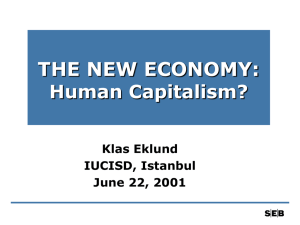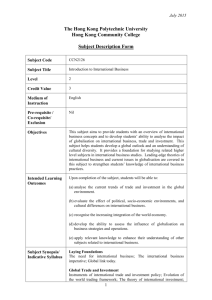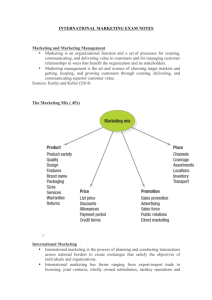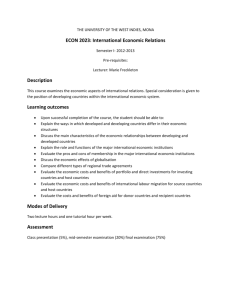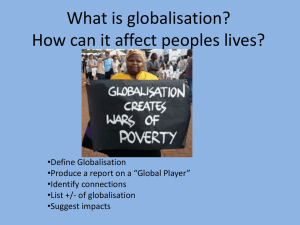Document 10465791
advertisement
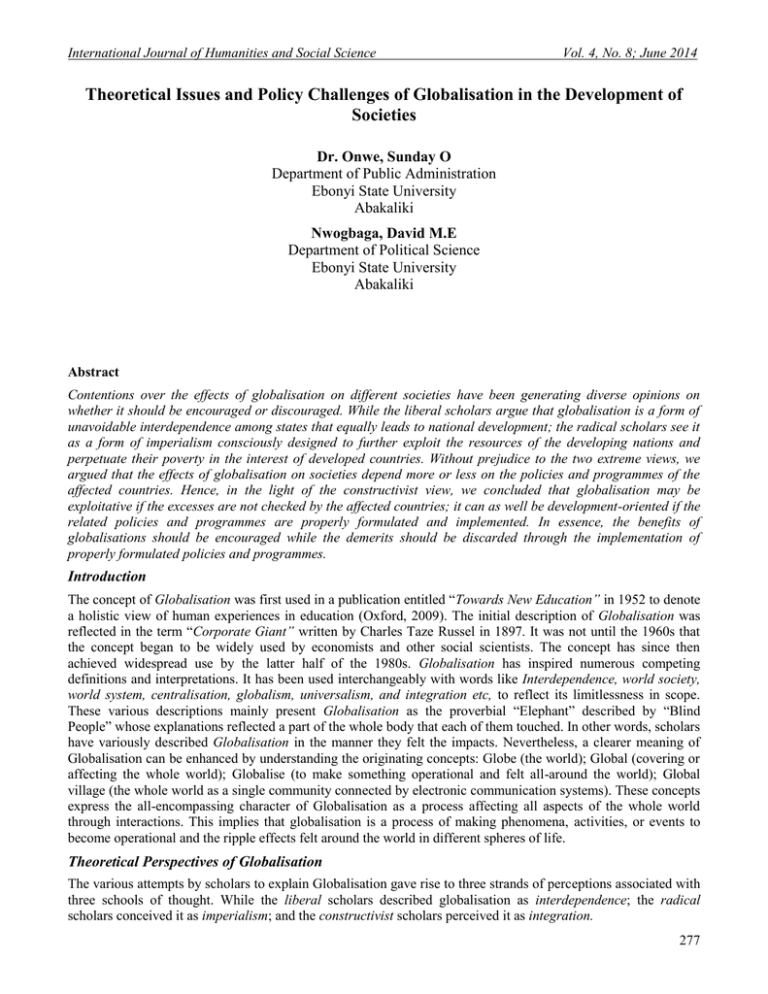
International Journal of Humanities and Social Science Vol. 4, No. 8; June 2014 Theoretical Issues and Policy Challenges of Globalisation in the Development of Societies Dr. Onwe, Sunday O Department of Public Administration Ebonyi State University Abakaliki Nwogbaga, David M.E Department of Political Science Ebonyi State University Abakaliki Abstract Contentions over the effects of globalisation on different societies have been generating diverse opinions on whether it should be encouraged or discouraged. While the liberal scholars argue that globalisation is a form of unavoidable interdependence among states that equally leads to national development; the radical scholars see it as a form of imperialism consciously designed to further exploit the resources of the developing nations and perpetuate their poverty in the interest of developed countries. Without prejudice to the two extreme views, we argued that the effects of globalisation on societies depend more or less on the policies and programmes of the affected countries. Hence, in the light of the constructivist view, we concluded that globalisation may be exploitative if the excesses are not checked by the affected countries; it can as well be development-oriented if the related policies and programmes are properly formulated and implemented. In essence, the benefits of globalisations should be encouraged while the demerits should be discarded through the implementation of properly formulated policies and programmes. Introduction The concept of Globalisation was first used in a publication entitled “Towards New Education” in 1952 to denote a holistic view of human experiences in education (Oxford, 2009). The initial description of Globalisation was reflected in the term “Corporate Giant” written by Charles Taze Russel in 1897. It was not until the 1960s that the concept began to be widely used by economists and other social scientists. The concept has since then achieved widespread use by the latter half of the 1980s. Globalisation has inspired numerous competing definitions and interpretations. It has been used interchangeably with words like Interdependence, world society, world system, centralisation, globalism, universalism, and integration etc, to reflect its limitlessness in scope. These various descriptions mainly present Globalisation as the proverbial “Elephant” described by “Blind People” whose explanations reflected a part of the whole body that each of them touched. In other words, scholars have variously described Globalisation in the manner they felt the impacts. Nevertheless, a clearer meaning of Globalisation can be enhanced by understanding the originating concepts: Globe (the world); Global (covering or affecting the whole world); Globalise (to make something operational and felt all-around the world); Global village (the whole world as a single community connected by electronic communication systems). These concepts express the all-encompassing character of Globalisation as a process affecting all aspects of the whole world through interactions. This implies that globalisation is a process of making phenomena, activities, or events to become operational and the ripple effects felt around the world in different spheres of life. Theoretical Perspectives of Globalisation The various attempts by scholars to explain Globalisation gave rise to three strands of perceptions associated with three schools of thought. While the liberal scholars described globalisation as interdependence; the radical scholars conceived it as imperialism; and the constructivist scholars perceived it as integration. 277 © Center for Promoting Ideas, USA www.ijhssnet.com The liberal scholars hold the opinion that globalisation refers to growing interdependence of states which is a driving force for a holistic positive development across national boundaries. Globalisation therefore lifts countries out of poverty given that it causes a virtuous economic cycle associated with faster economic growth (Bhagwati, 2005). The liberal scholars point to the benefits and gains of globalisation as interdependence and portray it as natural, evolutionary and largely an inevitable development (Onuoha, 2008). Basically, the liberals strongly hold the opinion that: (a) no state can exist in isolation of other; thus, there should be full liberalisation to enable countries to enjoy the gains of co-operations, comparative advantages and mutual benefits (b) globalisation is a neutral and inevitable part of historical change and development (c) globalisation will increase the wealth and prosperity of all countries and people including workers as it helps to expand opportunities for nations and individuals of rich and poor countries alike (d) globalisation is the only positive part of the world economy to guarantee sustainable development (e) globalisation promotes equality and good governance through liberal democracy (f) globalisation encourages exchanges in cultural and educational values for a civilised behaviour and improved living standards (g) globalisation is the rational end-point of human development capable of impacting positively on the lives of state actors. In essence, globalisation has opened up the world, reduced the abuse of human rights and eradicated to a large extent, social, economic and political injustices by some national governments (Fukuyama, 1992). The radical or marxist view on the other hand contend that globalisation refers to imperialism which is concerned with transforming capitalist policies to further impoverish the developing nations at the periphery of the world capitalism. As a capitalist project, globalisation is structured to perpetuate underdevelopment of Africa and other third world countries. The radical scholars therefore construed globalisation in terms of exploitation and profit maximisation through the expansion of multinational corporations, and driven by the technical advances in communication (Akimboye, 2008). In the radical perspective, globalisation is not seen as a recent issue but a stage in the evolution and development of capitalism in which though there are changes in the operational strategies, the primary goal of profit maximisation through exploitation at the expense of satellite state remain the same (Toyo, 2000; Ninsin, 2000; Oriakhi, 2001). Against the view of the liberal scholars, the radical scholars aver that globalisation has the following effects on the affected countries: (a) it increases world poverty and lowers standards of living; (b) it increases the gap between the rich and the poor countries through excessive exploitation without redress; (c) it increases the gap between the rich and the poor within countries. The radicals therefore point out the increasing potential for economic crisis, the threat to the livelihood of workers and the growing income inequality caused by globalisation and the negative impacts on the third world. Without prejudice to the postulations of the liberal and radical scholars, one perceives the inevitability and irreversibility of the globalisation process as a force for changes in the society. But it cannot be taken hook, line and sinker that the changes which may occur as a result of globalisation are all gains and benefits; neither can we assume that they are all losses. Globalisation is associated with both positive and negative effects on the various societies as postulated by the constructivists. In essence, the constructivists who see globalisation as integration, advocate universal co-operations and interactions without restrictions among actors in the international community, but oppose the negative effects such as exploitation. This theoretical synthesis support international interactions through integration, but demand that values of democracy, economic justice, environmental protection, and human rights be put ahead of purely economic concerns. This viewpoint is more acceptable and preferable to the extreme views of the liberal and radical scholars. The constructivists’ ideas draw from the facts that globalisation is an inevitable and irreversible historical development associated with some positive impacts that must be appreciated as well as some negative consequences that cannot be ignored. Thus, the constructivists accept the virtues, but reject the vices of globalisation. While the constructivists accept the liberal view that globalisation is a historical development that can increase the wealth and prosperity among countries, they argue that it depends on how the globalisation policies and programmes are implemented. The constructivists contend that: (a) countries may not be better developed by locking up their borders against foreign goods and services; (b) the effects of globalisation on any country is determined by the activities undertaken by the participating countries; (c) while liberalization is an appreciable option in international relations, preferences should be given to production rather than consumption oriented in-flows of people, materials and capital; (d) priority should be given to export-oriented rather than import-oriented economic diversification (Onuoha, 2008). 278 International Journal of Humanities and Social Science Vol. 4, No. 8; June 2014 In line with the submission of the constructivists that globalisation has both negative and positive effects on societies, AuSAID (2004), World Bank (2004), and UNDP (2004) identified the merits and demerits of globalisation thus: Benefits of globalisation Problems of globalisation 1. Economies of countries that engage well with the international economy have consistently grown much faster than those countries that try to protect themselves. Well managed open economies have grown at rates that are on average 2 ½ percentage points higher than the rate of growth in economies closed to the forces of globalisation. There are social and economic costs to globalisation. Trade liberalisation rewards competitive industries and penalises uncompetitive ones, and it requires participating countries to undertake economic restructuring and reform. While this will bring benefits in the long term, there are dislocation costs to grapple with in the immediate term, and the social costs for those affected are high. 2. Countries which have had faster economic growth have then been able to improve living standards and reduce poverty. India has cut its poverty rate in half in the past two decades. China has reduced the number of rural poor from 250 million in 1978 to 34 million in 1999. Cheaper imports also make a wider range of products accessible to more people and, through competition, can help promote efficiency and productivity. Some countries have been unable to take advantage of globalisation and their standards of living are dropping further behind the richest countries. The gap in incomes between the 20% of the richest and the poorest countries has grown from 30 to 1 in 1960 to 82 to 1 in 1995. 3. Improved wealth through the economic gains of globalisation has led to improved access to health care and clean water which has increased life expectancy. More than 85 percent of the world's population can expect to live for at least sixty years (that's twice as long as the average life expectancy 100 years ago!) Increased trade and travel have facilitated the spread of human, animal and plant diseases, like HIV/AIDS, SARS and bird flu, across borders. The AIDS crisis has reduced life expectancy in some parts of Africa to less than 33 years and delays in addressing the problems, caused by economic pressures, have exacerbated the situation. Globalisation has also enabled the introduction of cigarettes and tobacco to developing countries, with major adverse health and financial costs associated with that. 4. Increased global income and reduced investment barriers have led to an increase in foreign direct investment which has accelerated growth in many countries. In 1975, total foreign direct investment amounted to US$23 billion while in 2003 it totalled US$575 billion. The increasing interdependence of countries in a globalised world makes them more vulnerable to economic problems like the Asian financial crisis of the late 1990's. 5. Improved environmental awareness and accountability has contributed to positive environmental outcomes by encouraging the use of more efficient, less-polluting technologies and facilitating economies' imports of renewable substitutes for use in place of scarce domestic natural resources. The environment has been harmed as agricultural, forest, mining and fishing industries exploit inadequate environmental codes and corrupt behaviour in developing countries. Agricultural seed companies are destroying the biodiversity of the planet, and depriving subsistence farmers of their livelihood. 279 © Center for Promoting Ideas, USA www.ijhssnet.com 6. Increasing interdependence and global institutions like WTO and World Bank, that manage the settlement of government-to-government disputes, have enabled international political and economic tensions to be resolved on a "rules based" approach, rather than which country has the greatest economic or political power. Importantly it has bolstered peace as countries are unlikely to enter conflict with trading partners and poverty reduction helps reduce the breeding ground for terrorism. The major economic powers have a major influence in the institutions of globalisation, like the WTO, and this can work against the interests of the developing world. The level of agricultural protection by rich countries has also been estimated to be around five times what they provide in aid to poor countries 7. Improved technology has dramatically reduced costs and prices changing the way the world communicates, learns, does business and treats illnesses. Between 1990 and 1999, adult illiteracy rates in developing countries fell from 35 per cent to 29 per cent. Trade liberalisation and technological improvements change the economy of a country, destroying traditional agricultural communities and allowing cheap imports of manufactured goods. This can lead to unemployment if not carefully managed, as work in the traditional sectors of the economy becomes scarce and people may not have the appropriate skills for the jobs which may be created. 8. Modern communications and the global spread of information have contributed to the toppling of undemocratic regimes and a growth in liberal democracies around the world. Modern communications have spread an awareness of the differences between countries, and increased the demand for migration to richer countries. Richer countries have tightened the barriers against migrant workers, xenophobic fears have increased and people smugglers have exploited vulnerable people. 9. The voluntary adoption by global companies of workplace standards for their internationalised production facilities in developing countries has made an important contribution to respect for international labour standards. Wages paid by multinationals in middle- and low-income countries are on average 1.8 to 2.0 times the average wages in those countries. Globalised competition can force a 'race to the bottom' in wage rates and labour standards. It can also foster a 'brain drain' of skilled workers, where highly educated and qualified professionals, such as doctors, engineers and IT specialists, migrate to developed countries to benefit from the higher wages and greater career and lifestyle prospects. This creates severe skilled labour shortages in developing countries. 10. International migration has led to greater recognition of diversity and respect for cultural identities which is improving democracy and access to human rights. Source:AusAID,2004, http://www.ausaid.gov.au/ 280 Indigenous and national culture and languages can be eroded by the modern globalised culture. Sources: The World Bank, 2004, http://www.worldbank.org/ United Nations Development Programme, 2004 http://www.undp.org/ International Journal of Humanities and Social Science Vol. 4, No. 8; June 2014 Forms of Globalisation The various forms of globalisation include political, economic, socio-cultural, religious and educational dimensions. These have been explained in different terms and contexts. Political globalisation refers to the process of integration and unification of national governments into the world’s system of governance. Political globalisation occurs at two main levels: ideological and institutional (Stipo, 2009). At the ideological level, it implies the extension of some basic ideas, ethics and values of governance across national boundaries as a way of mobilizing international alliances. For instance, efforts by the capitalist west to advance liberal democracy, and the socialist east to promote democratic socialism can be interpreted as political globalisation. Thus, political globalisation at the ideological level seeks to integrate countries into having common orientations about governance (Stipo, 2009). At the institutional level, political globalisation is concerned with creating common legal, organisational and communication structures to legislate and enforce laws, administer or run intergovernmental bodies and harmonise information for transmission beyond national boundaries. The institutional level of political globalisation therefore implies the establishment of common governments such as the United Nations (UN) with the purpose of having its laws, policies/programmes, and the information system superior to the national alternatives. In this light, political globalisation limits national sovereignty given that the member countries of such an international intergovernmental institutions are required to subsume their powers and authorities to the controls and regulations of the umbrella body. Hence, political globalisation implies ideological expansion and the subordination of national powers to international authorities. Economic Globalisation refers to the process of opening economies from all forms of restrictions to enhance the free flow of human and material resources among countries that share alliances and expansion to incorporate other countries (McMahon and Tschetter, 1986). The overall ambition is to establish a Free World Market Economy in which all nations would participate and operate along a set of rules. Economic globalisation has four main aspects: industrial, financial, trade, and labour (Michel, 2003). Industrial economic globalisation refers to the emergence of worldwide production markets and broader access to a range of foreign products for consumers and companies; particularly the movement of industrial materials between and within countries. Financial economic globalisation is concerned with the emergence of worldwide financial markets and greater access to external financing for borrowers through such institutions as the International Monetary Fund (IMF) and World Bank. Trade-related economic globalisation is focused on the unrestricted exchange of goods, services, and capital. The interconnectedness of these trading markets however meant that an economic collapse in one area would impact on others as recorded in the economic melt-down or depression in the first decade of the 21st century. In the labour aspect of economic globalisation, workers compete in the international labour market for wages which invariably become less dependent on the successes or failure of individual national economies. In essence, with economic globalisation, companies can produce goods and services in one location at very low cost. This may cause jobs to be moved to locations that have the lowest wages, least workers’ protection and lowest health benefits, for industrial activities. Importantly, economic globalisation in general implies: o Removal of all barriers on investment and investment capital; o Competition of agricultural and industrial productions in the free market; o Expansion and integration of national economies through financial markets (Osakwe and Osakwe, 2005). Economic globalisation is therefore a comprehensive process which includes production, consumption, and the organisation of material and non-material life according to the ethos of the prevailing economic system (Alubo, 1990). Cultural Globalisation in itself implies the extension of people’s traditions, customs and values to other parts of the world through interactions without restrictions (Chapman, 2009). This world-wide standardisation of culture suggests the process of applying, influencing and extending a common way of life among different peoples through growing contacts between different cultures leading partly to greater understanding and cooperation, as well as the emergence of transnational communities and hybrid identities. Globalisation in this context breaks the boundaries of strict cultural relativities (Moghadam, 2005). Cross-cultural globalisation therefore means the spreading of cultures through international travels and tourism, migration, sale of local consumer products to other countries adapted to the culture (Pieterse, 2004). Some individuals bemoan the resulting consumerism and loss of languages and local culture, which cause reduction in diversity or even assimilation; others say it promotes peace and understanding; yet, others say that it obliterates cultures (Pieterse, 2004; Moghadam, 2005). 281 © Center for Promoting Ideas, USA www.ijhssnet.com There are three theoretical postulations that seek to explain cultural globalisation: the dominant culture thesis, the clash of civilisation thesis, and the creolisation or hybridity thesis (Moghadam, 2005). The dominant culture thesis hold that in the course of interaction among the citizens of different countries, the more influential cultures dominates the world, obliterating all other ones in their part, thereby promoting common customs, beliefs, eating and dressing codes around the world. In line with this thesis, it is observed that a great deal of what is becoming world culture is western, especially American, in its origin. The impact is a function of the domineering economic and political strength as well as influences of Western Europe and US (Rourke and Boyer, 2002). In relation to language, the ligua franca of globalisation is English: the emails, telexes, cables, radio programmes and internet are dominated by English language. On the other hand, the clash of civilisation thesis holds that under threats resulting from interactions among different people, cultural entities become more rigid and immutable, and play out their divisions in terms of ethnic, religious, racial and national violence in order to protect and safeguard their identities as a people. This view is reflected in the oppositions of some islamic fundamentalists like the “Boko Harams” which literally means “No Western Education”. In other words, transnational flow of people increases a people’s reflexivity, revalorisation, and revitalisation tendencies towards their own folkways, customs and beliefs as they assess their own cultures against others, including incoming powerful cultures. The Creolisation or hybridisation thesis in itself originated from the concept of Creole (a person of mixed race, especially of european and african blends). The creolisation thesis postulates that increased mobility and connectivity of people across national boundaries have broken down major barriers separating one culture from another. Consequently, different cultures are harmonised and integrated resulting in complex new synthesis manifest in the development of innovative travelling cultures. Generally, cultures evolve, intermingle and even merge (Rourke and Boyer, 2002). Hence, with the effect of cultural globalisation, it is difficult to distinguish local identities from foreign identities due to the homogenisation of ways of life in eating, dressing, worshipping, communication, sports, language and music etc. Religious Globalisation is the process of extending religious doctrines around the world to spread common faith (Rourke and Boyer, 2002). The early periods of international relations relied on religious doctrines as standards of interactions among nations. These standards of international relations based on religious doctrines derived from the writings of St. Augustine, St. Thomas Acquinas, and long standing Islamic, Budhist as well as other religious laws and scholarship that served as foundation for just international conduct (Rourke and Boyer, 2002). There are three elements of religious globalisation: evangelisation, fundamentalism, and morality. Evangelisation refers to the process of persuading people to accept and believe in certain religious doctrines. Fundamentalism on the other hand is the practice of following very strictly the basic tenets, rules, and teachings of any religion; while morality refers to the ethics and principles concerning right and wrong, or good and bad behaviour among people, religious groups or societies. These are the essential elements that constitute the driving force of religious globalisation. However, religious fundamentalism (otherwise called religious traditionalism) appears to have gained strength in many areas of the world due to the coercive approach to asserting its associated religious doctrines around the world. Religious fundamentalism holds conservative religious values and wishes to incorporate those values into secular political activities such as making laws that would apply not only to the faithful who agree with them, but also to everyone within the country, and if possible, outside the country (Rourke and Boyer, 2002). There is a transnational element or religious fundamentalism which require that loyalty to religion should supersede patriotism and that all adherents of their religion should be united politically to bring people together across borders, drive out people of another faith or “no faith”, or suppressing their freedom within borders (Rourke and Boyer, 2002). In the aspect of morality, religious globalisation advances three notions across the world: moral absolutism, moral prudence, and moral relativism (Rourke and Boyer, 2002). Moral absolutism suggests that ends never justifies the means of actions, instead, morality should be the supreme guide of human actions particularly in regard to interactions across national boundaries. Moral prudence implies that there is a middle ground between amorality and moral absolutism that acts as guide to human actions. Then, moral relativism means that human actions must be placed in the context of occurrence as basis for justification. It is important to note that the various dimensions of globalisation do not operate in isolation; they are interdependent. Nevertheless, economic globalisation is the most paramount dimension around which political, cultural, and religious activities revolve in the world system. 282 International Journal of Humanities and Social Science Vol. 4, No. 8; June 2014 The Policy Challenges of Globalisation Globalisation has various impacts on different countries. But the degree and nature of the effects largely depends on the roles played by the countries involved. Nonetheless, the globalisation process is faced with the following challenges: 1. How to ensure that the benefits of globalisation extend to all countries and the parts therein. 2. How to deal with the fear that globalisation leads to instability which is particularly marked in the developing world. 3. How to address the fear in the industrialised world that increased global competition will lead inexorably to a race to the bottom in wages, labour rights, employment practices, and the environment. 4. How to search for new ways to cooperate in the overall interest of countries and people. 5. How to reform the financial sector to absorb the shocks and effects of globalisation by flexibly responding to changes in the financial markets. 6. How to formulate appropriate policy responses to globalisation processes as to fully maximise the benefits while minimising the risks and losses therein. 7. How to maintain state sovereignty in the face of weakening national powers in favour of international intergovernmental bodies. 8. How to guarantee macroeconomic stability embodied in low inflation, appropriate real exchange rates and prudent fiscal stance. This is a precondition for benefiting from and sustaining private capital flows. 9. How to promote openness to trade and capital flows in order to rationalise and liberalise exchange and trade regimes in international competition without compromising standards and dumping. 10. How to limit government intervention to areas of genuine market failure and to the provision of the necessary social and economic infrastructure without compromising exploitation. These challenges identified above are issues that if they are not properly addressed, tend to present the negative effects of globalisation on affected countries. But where these challenges are taken into considerations, globalisation will be perceived as beneficial because the impacts will be positive. Meanwhile, exploring the potential benefits of globalisation by any country can be enhanced through: (a) Implementing policies that make the economies structurally flexible. (b) Diversification of the economy towards production and manufacturing to reduce their vulnerability to exogenous shocks. These include further reforms in the areas of public enterprise activities, the labour markets, and the trade regimes. (c) Increasing investment in education, health and research that can help improve productivity. (d) Improving the effectiveness of public institutions and governance system to guarantee efficient policy formulation and implementation with respect to globalisation processes. (e) Localising new developmental initiatives adaptable to the socio-economic and political environment. (f) Furthering regional integration efforts so as to increase market size, improve the bargaining power in trade negotiations, and enhance intra-regional trade. This would however require the harmonisation of some socioeconomic policies especially on the mobility of labour and trade transactions. Reflections on Anti-Globalisation Crusades Anti-Globalisation crusades refer to the processes or actions taken by some actors (a state or its people) in order to demonstrate its sovereignty and practice democratic decision making. This has led to the formation of various movements concerned primarily with the negative impacts of globalisation in developing countries. Their concerns range from issues like democracy, national sovereignty, and the exploitation of workers. Some of these anti-globalisation movements include: Global Justice Movement, Anti-Corporate-Globalisation Movement, AlterGlobalisation Movement, and Counter-Globalisation. The various anti-globalisation groups fight against damages to the planet in terms of the perceived unsustainable harm done to the biosphere as well as the perceived human costs like poverty, inequality, miscegenation, injustice, and the erosion of traditional cultures which occur as a result of transformation related to globalisation. Meanwhile, the critiques of globalisation generally argue that the process results in: 283 © Center for Promoting Ideas, USA www.ijhssnet.com (a) The promotion of the privileged rights of investors and lenders, while those of the people (the citizens) are incidental and considered matters of convenience. (b) Poorer countries suffering from disadvantages: While it is true that globalisation encourages free trade among countries, there are also negative consequences because some countries try to save their national markets through protectionist policies. (c) The exploitation of foreign impoverished workers: The deterioration of protections for weaker nations by stronger industrialised powers has resulted in the exploitation of the people in those nations to become cheap source of labour. Due to inadequate protections, companies from powerful industrialised nations are able to offer workers enough salary to entice them to endure extremely long hours and unsafe working conditions, though economists question if consenting workers in a competitive employers’ market can be decried as “exploited”. It is true that the workers are free to leave their jobs; but in many poorer countries, this would mean starvation for the workers and the dependants if there are no other jobs (Michel, 2003). (d) The Shift to Outsourcing: Globalisation has allowed corporations to move manufacturing and service jobs from high cost locations to areas with the lowest wages and workers benefits. This results in loss of jobs in the high cost locations. Thus, families that were once part of the “middle class” are forced into lower positions by massive layoffs and outsourcing to another country. This also means that people in the lower class have a harder time climbing out of poverty because of the absence of the middle class as a stepping stone (Macmahon and Tschetter, 1986). (e) Weak labour Unions: The ever growing number of companies in transition has caused a weakening of labour unions. Unions lose their effectiveness when their membership begins to decline. As a result, unions hold less power over corporations that are able to easily replace workers, often for lower wages and have the option of not offering unionized jobs anymore. (f) An increase in the exploitation of child labour: A country that experiences increases in labour demands because of globalisation and an increase in the demand for goods produced by children will experience a greater demand for child labour. This can be hazardous or exploitative as in quarrying, cash cropping, prostitution, pornography and other illicit activities (Nina, 2005). Conclusion Globalisation will be viewed better from the perspective of constructivism, rather than the extremes of liberalism and radicalism. In as much as there are indications of imperialist exploitation in the globalisation processes, we cannot deny the fact that there are also attendant benefits. We cannot therefore lose sight of the benefits of globalisation in order to avoid the negative effects. The impacts of globalisation on any society depend more or less on how the globalisation policies and programmes are formulated, implemented, monitored, and evaluated. Globalisation is therefore a development challenge that needs to be tackled technically by nations through transformative policies and programmes rather than outright attempts to stop the inevitable processes. Hence, as we heed the contentions of the critics, they should be viewed as basis for modification rather than termination of the policies and programmes related to globalisation in order to explore the merits and discard the demerits. 284 International Journal of Humanities and Social Science Vol. 4, No. 8; June 2014 References Alubo, C. (1990): “Globalisation and the Changing Role of University in Nigeria”, in Newsletter of the Social Science Council of Nigeria, vol. 2, no. 1. Akimboye (2008): Globalisation and the Challenge for Nigeria’s Development in the 21st Century. Lagos: University Press. Ake, C. (1995): “The New World Order: The View from Africa”, in Hans, H. and Sovensen, G. (eds.): Whose World Order: Uneven Globalisation and End of Cold War. London: West View Press. AusAID, (2004): “The Benefits of Globalisation”, online: http://www.ausaid.gov.au/ Bhagwati, J. N. (2005): In Defence of Globalisation. New York: Oxford University Press. Chapman, R. (2009): “Culture Wars: An Encyclopedia of Issues, Viewpoints and Voices” , Vol. 1: M.E. Sharp. Fukuyama, F. (1992): The End of History and the Last Man. London: Hamish Hamilton. Marshal, M. and Bruce, R. P. (1992): “The Global Village: Transformations in World Life and Media in the 21st Century”. Oxford: Oxford University Press. McMahon, J.P. and Tschetter, H. (1986): “The Declining Middle Class: A Further Analysis”. Monthly Labour Review, Vol. 109 Michel, C. (2003): “The Globalisation of Poverty and the New World Order”. 2nd Ed. Imprint Shanty Bay, Ont: Global Outlook. Moghadam, V. M. (2005): Globalising Women: Transnational Feminist Networks. Baltimore, M.D.: The John Hopkins University Press. Nina, P. (2005): “Child Labour in the Global Economy”. Journal of Economic Perspectives. Ninsin, K. A. (2000): “Globalisation and the Future of Africa”. AAPS Occasional Paper Series, 4(No. 1). Onuoha, J. (2008): Beyond Diplomacy: Contemporary Issues in International Relations. Nsukka: Great AP Express Publishers Ltd. Oriakhi, F. (2001): “Globalisation as Imperialism: The Nigerian Experience”, in Odion-Akhaine, S. (ed.): Globalisation, United Nations and the Fring Players. Lagos: CENCOD. Osakwe, A. and Osakwe, P. (2005): “Globalisation, Trade and African Development”, in, Obi, E. A. et al (2005): State and Economy. Onitsha: Bookpoint Ltd. Oxford (2009), cited in Wikipedia (2011): “Globalisation”, online:http://en.wikipedia.org/accessed: 11/07/2011. Pieterse (2004): “Globalisation and Culture: Global Melange”, in Cohen, R. and Tonitato, P. (2011): Cultural Globalisation. Online: http://en.wikipedia.org Rourke, J. T. and Boyer, M. A. (2002): World Politics: International Politics on the World Stage, Brief. Dushkin: McGraw-Hill. Stipo, F. (2009):"World Government, US”, online:http://www.usacor.org/ The World Bank, (2004): “The Problems of Globalisation”, Online: http://www.worldbank.org/ Toyo, E. (2000): Background to Globalisation. Ibadan: ASUU Publication Series; UNDP National Huwain Development Reports for Nigeria, 2000/2001. United Nations Development Programme (2004): “The Problems of Globalisation”, Online: http://www.undp.org/ 285

